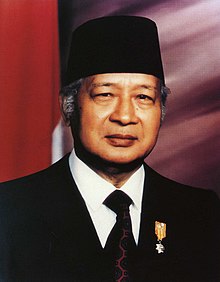President Suharto
| Suharto | |
|---|---|

Suharto in 1993
|
|
| 2nd President of Indonesia | |
|
In office 27 March 1968 – 21 May 1998 Acting: 12 March 1967 – 27 March 1968 |
|
| Vice President |
Hamengkubuwono IX Adam Malik Umar Wirahadikusumah Sudharmono Try Sutrisno B. J. Habibie |
| Preceded by | Sukarno |
| Succeeded by | B. J. Habibie |
| 16th Secretary General of Non-Aligned Movement | |
|
In office 7 September 1992 – 20 October 1995 |
|
| Preceded by | Dobrica Ćosić |
| Succeeded by | Ernesto Samper Pizano |
| 4th Indonesian Armed Forces Commander | |
|
In office 1969–1973 |
|
| Preceded by | Abdul Haris Nasution |
| Succeeded by | Maraden Panggabean |
| 8th Indonesian Army Chief of Staff | |
|
In office 1965–1967 |
|
| Preceded by | Pranoto Reksosamudro |
| Succeeded by | Maraden Panggabean |
| 14th Minister of Defence and Security of Indonesia | |
|
In office March 1966 – September 1971 |
|
| President |
Sukarno Himself |
| Preceded by | M. Sarbini |
| Succeeded by | Maraden Panggabean |
| 1st Armed Force and Strategic Reserve (KOSTRAD) Commander | |
|
In office 1961–1965 |
|
| Preceded by | Position created |
| Succeeded by | Umar Wirahadikusumah |
| Personal details | |
| Born |
8 June 1921 Kemusuk, Dutch East Indies |
| Died | 27 January 2008 (aged 86) Jakarta, Indonesia |
| Nationality | Indonesian |
| Political party | Golkar |
| Spouse(s) | Siti Hartinah (m. 1947–1996; her death) |
| Children |
Siti Hardiyanti Rukmana (Tutut) Sigit Harjojudanto Bambang Trihatmodjo Siti Hediati Hariyadi (Titiek) Hutomo Mandala Putra (Tommy) Siti Hutami Endang Adiningsih |
| Religion | Sunni Islam |
| Signature |  |
| Military service | |
| Allegiance | Indonesian National Armed Forces |
| Service/branch |
|
| Rank |
|
Suharto (![]() pronunciation ; 8 June 1921 – 27 January 2008) was the second President of Indonesia, holding the office for 31 years from the ousting of Sukarno in 1967 until his resignation in 1998.
pronunciation ; 8 June 1921 – 27 January 2008) was the second President of Indonesia, holding the office for 31 years from the ousting of Sukarno in 1967 until his resignation in 1998.
Suharto was born in a small village, Kemusuk, in the Godean area near the city of Yogyakarta, during the Dutch colonial era. He grew up in humble circumstances. His Javanese Muslim parents divorced not long after his birth, and he was passed between foster parents for much of his childhood. During the Japanese occupation of Indonesia, Suharto served in Japanese-organised Indonesian security forces. Indonesia's independence struggle saw his joining the newly formed Indonesian army. Suharto rose to the rank of Major General following Indonesian independence. An attempted coup on 30 September 1965 allegedly backed by the Indonesian Communist Party was countered by Suharto-led troops. The army subsequently led an anti-communist purge which the CIA described as "one of the worst mass murders of the 20th century" and Suharto wrested power from Indonesia's founding president, Sukarno. He was appointed acting president in 1967, replacing Indonesian founding father Sukarno, and elected President the following year. He then mounted a social campaign known as De-Soekarnoization in an effort to reduce the former President's influence. Support for Suharto's presidency was strong throughout the 1970s and 1980s. By the 1990s, the New Order's authoritarianism and widespread corruption were a source of discontent and, following a severe financial crisis, led to widespread unrest and his resignation in May 1998. Suharto died in 2008 and was given a state funeral.
...
Wikipedia
